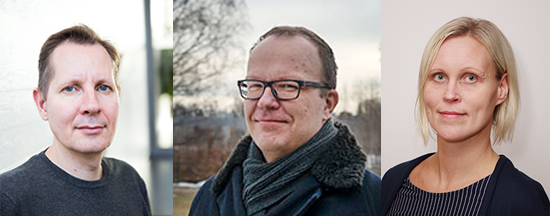
Sampsa Koponen, Pekka Hurskainen and Salla Selonen. © Luukas Myller, Riku Lumiaro, Timo Vänni.
Finnish Environment Institute SYKE is starting more than ten new EU projects this year. The projects tackle a wide range of questions, including ecosystem accounting, microplastics in agricultural land and cyanobacteria monitoring using satellite observation. The projects represent well SYKE’s versatile research into a wide range of environmental issues.
Six of the new EU projects are initiated with funding from the Horizon 2020 programme. The Laboratory Centre will also participate in projects funded by the European Metrology Programme for Innovation and Research EMPIR. SYKE is the lead partner in the ENVECOPACK project which has received funding from the European Statistical Office EUROSTAT grants for the fourth consecutive year.
Ecosystem accounting for a sustainable society
SYKE and the Natural Resources Institute Finland (Luke) will continue their successful cooperation in developing environmental and ecosystem accounting in the two-year ENVECOPACK project.
Ecosystem accounting broadens the scope of traditional national economy to include the benefits of ecosystem services for human wellbeing as well as bringing forward the dependencies between the economy and ecosystems.
Lead by Researcher Pekka Hurskainen, the consortium will pilot accounting indicators for sea, water and urban ecosystems as well as packing materials.
“We are excited to participate in developing brand new methods for environmental and ecosystem accounting that will hopefully bring new solutions to small but important issues for a more sustainable society”, Hurskainen says. “This is increasingly topical right now when ecosystem accounting is going to be mandatory for all EU member states”, he continues.
Taking a close look at microplastics in agriculture
The PAPILLONS project, which will study the effects of chemicals released from micro and nanoplastics that originate from agricultural plastic use, will be launched this spring. The project is led by the Norwegian Institute for Water Research NIVA.
PAPILLONS will research the impacts of agricultural plastics on soil and ecosystem services. The use of microplastics in agriculture is to be surveyed throughout Europe. The formation of microplastics and their spread to soil and organisms as well as water bodies will be researched experimentally. PAPILLONS aims to produce information for policymakers, farmers, industry and communities to develop sustainability in agriculture.
SYKE’s contribution to the project, led by Senior Research Scientist Salla Selonen, will focus on ecological impacts and also take part in two other central work packages.
“In the last few years SYKE has developed research into microplastics occurring in soil, and we have recently acquired a new FTIR spectrometer that we can use in future research. PAPILLONS will also aim to harmonize research methods between different laboratories”, Selonen says. “I’m especially excited to work in a large international community and research a topic that is close to my interests”, Selonen continues.
WQeMS monitors cyanobacteria growth using satellite observations
The main objective of the EU Horizon 2020 funded WQeMS project is to create a service for water treatment plants and environmental authorities to monitor the state of lakes acting as water sources with help from satellite observations and other measurements. Coordinated by the Greek Research and Technology Centre Hellas (CERTH), the project has 11 partners across Europe.
SYKE’s part of the project will be led by the Head of Geoinformatics Research Unit Sampsa Koponen, and SYKE’s marine and freshwater researchers will take part as well.
“SYKE has developed satellite observation systems for water bodies for 25 years and it provides environmental information in the open TARKKA service and the STATUS service offered for environmental authorities. This project allows us to improve our services especially in freshwater cyanobacterial monitoring”, Koponen says.
The system will be piloted in the lake Pien-Saimaa, which is a source of drinking water for the City of Lappeenranta. Some cyanobacterial blooms have previously been detected in the water, which can deteriorate water quality. The project also aims to monitor the effects of agriculture, industry and water releases on the state of the lake over a longer time period.
List of SYKE's new EU projects
- CRiceS: Climate Relevant interactions and feedbacks: the key role of Sea Ice and Snow in the polar and global climate system
- Eiffel: Revealing the role of GEOSS as the default digital portal for building climate change adaptation & mitigation applications
- MINKE: Metrology for Integrated Marine Management and Knowledge-Transfer Network
- PAPILLONS: Plastic in Agricultural Production: Impacts, Life-cycle and LONg-term Sustainability
- WQeMS: Copernicus Assisted Lake Water Quality Emergency Monitoring Service
- COMPLETE PLUS: Practical implementation of the COMPLETE project outputs and tools
- ENVECOPACK: Developing pilot accounts for marine, freshwater and urban ecosystems and packaging materials
- SApHTIES: Metrology for standardised seawater pHT measurements in support of international and European climate strategies
- POLMO: Support for a European Metrology Network on pollution monitoring
- MetrocycleEU: Metrology for the recycling of Technology Critical Elements to support Europe’s circular economy agenda
- HELCOM BLUES: HELCOM Biodiversity, Litter, Underwater noise and Effective regional measures for the Baltic Sea
- ETC-ICM West Balkans: Strengthening the participation of the Western Balkans in the work of the European Environment Agency 2020-2021 Actions for Water and Foresight assessments
More information
- Researcher Pekka Hurskainen, fistname.lastname@syke.fi, Tel. +358 295 252 036.
Pekka Hurskainen's information page.
- Head of Geoinformatics Research Unit Sampsa Koponen, firstname.lastname@syke.fi, Tel. +358 295 251 295.
- Senior Research Scientist Salla Selonen fistname.lastname@syke.fi, Tel. +358 295 251 902.
Salla Selonen's information page.